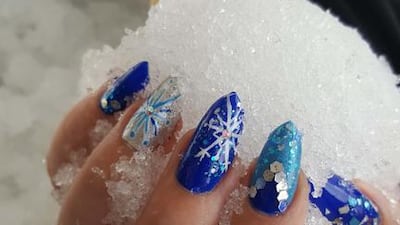UAE sun-seekers are being urged to take care while topping up their tans as the heat climbs this summer.
Skin experts pointed out the health risks as temperatures begin to climb.
May is Skin Cancer Awareness Month.
One in every three cancers diagnosed in the world today is a skin cancer, and even though survival rates are high, so is complacency say doctors.
In recent weeks, BBC Weather, one of the few global forecasters to publish daily UV levels, rated levels in the UAE as 'extreme' - the highest on its chart.
Dr Shivani Wadhwa, one of the country’s top dermatologists, at Fakeeh University Hospital in Dubai, said current UV levels were already in the high-risk category.
“In Dubai, the sun shines very strongly, even in winter,” she said.

The UV index in the summer months, between March and September, is usually the highest.
“At the moment, the UV index is in the range of 8-9, which is considered a high-risk category.”
The index is an international standard measurement of the intensity of radiation emitting from the Sun.
Summer sunshine can be a health risk
Most skin types are able to get a perfect tan when the index is between 3 and 7, anything above that is considered dangerous to the skin.
“Sunburn is one of the most dangerous results of sun damage,” Dr Wadhwa said.
“However, other related issues include damaged skin cells, damaged blood vessels, skin that starts to look wrinkled, dry, patchy and stretchy."
Because of sun damage, the skin becomes prone to further damage such as bruising, and the slow healing of cuts.
“The most serious threat is of skin cancer, and its prevalence is increasing globally,” she said.
According to the World Health Organisation (WHO) there are between two and three million new cases of skin cancer every year around the world.
The WHO said the numbers were rising because more UV radiation finds its way to the Earth’s surface as the ozone layer continues to be depleted by pollution.
Another Dubai dermatologist said it was vital that people care for their skin in the Middle East.
“Applying a broad spectrum sunscreen with a SPF of 50+, depending on your skin type, will protect your skin from dryness and damage from harsh UV radiation,” said Dr Saima Anwar, a dermatologist from the Nova Clinic.
“If you are staying outdoors for more than two hours then remember to reapply the sunscreen, and I’d recommend even more frequent use for people taking part in outdoor sports, water sports or swimming.
“One thing to remember is to always make sure you protect your eyes, lips and feet as well.”
Cover up to stay safe
Covering up during peak sunshine hours is key to staying safe in the heat, another dermatologist said.
“Unprotected skin will be damaged and can burn in minutes,” said Edwidge Gandin, a beautician from Pastels Salon in Dubai.
“In addition to wearing sunscreen, avoid the sun between 11am and 3pm. If you are in the sun, cover up, and wear a hat, sunglasses and sunscreen.
“Also, don’t forget that white sand and other bright surfaces reflect UV and increase UV exposure.”
The most common mistake people make in the sun is they forget to reapply their sunblock, which needs to be touched up every two hours, she said.
By exposing your skin to the sun, you will accelerate the ageing process and see visible signs of damage,” Ms Gandin said.
“Aside from suffering from the redness associated with sunburn, your skin will take on a dehydrated appearance and you will see sunspots, pigmentation differences occurring on the surface of the skin,” she said.
“Although a tan may be a beauty ideal, it is better to avoid tanning because a tan is evidence of the skin having been damaged.”













